VENN DIAGRAM FOR A COMPLEMENT
Here we are going to see how to draw a venn diagram for A complement.
To draw a venn diagram for A', we have shade the region that excludes A
A'
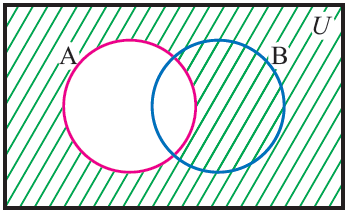
To draw a venn diagram for B', we have shade the region that excludes B
B'
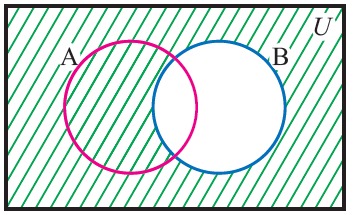
If A ⊆ U, where U is a universal set, then U \ A is called the compliment of A with respect to U. If underlying universal set is fixed, then we denote U \ A by A' and it is called compliment of A.
A' = U \ A
The difference set set A \ B can also be viewed as the compliment of B with respect to A.
If B ⊆ U, where U is a universal set, then U \ B is called the compliment of B with respect to U. If underlying universal set is fixed, then we denote U \ B by B' and it is called compliment of B.
B' = U \ B
The difference set set B \ A can also be viewed as the compliment of B with respect to A.
Example 1 :
From the venn diagram, write the elements of the following sets
(i) A' (ii) B' (iii) (A n B)' (iv) (A U B)'
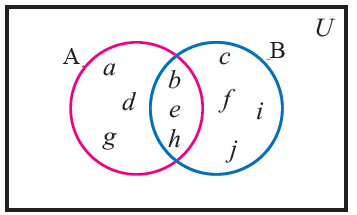
Solution :
(i) A'
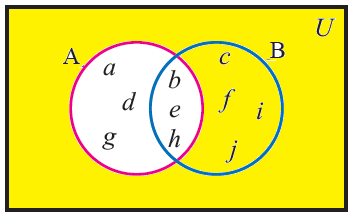
A' = { c, f, i ,j }
(ii) B'
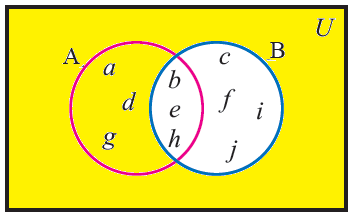
B' = { a, d, g }
(iii) (A n B)'
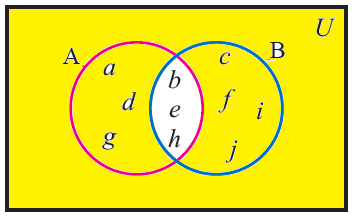
(A n B)' = { a, d, g, c, f, i, j }
(iv) (A U B)'
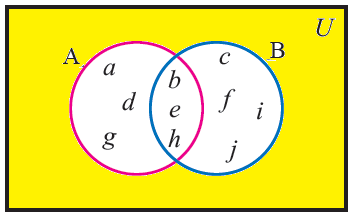
(A U B)' = { } (or) null set
Example 2 :
If n(U) = 43, n (A) = 26 find n (A')
Solution :
By using the formula,
n (A) + n (A') = n (U)
we may find the value of n (A')
26 + n (A') = 43
Subtract 26 on both sides
26 - 26 + n (A') = 43 - 26
n (A') = 17
Example 3 :
If n (U) = 38, n (A) = 16, n (A n B) = 12, n (B') = 20, find n (A U B).
Solution :
By using the formula,
n (B) + n (B') = n (U)
we may find the value of n (B')
n (B) + 20 = 38
Subtract 20 on both sides
n (B) + 20 - 20 = 38 - 20
n (B) = 18
n (A U B) = n (A) + n (B) - n (A n B)
= 16 + 18 - 12
= 34 - 12
= 22
Related topics
- Venn diagram A U B
- Venn diagram A n B
- Venn diagram of A'
- Venn diagram of B'
- Venn diagram of (AUB)'
- Venn diagram of (AnB)'
- Venn diagram of A\B
- Venn diagram of B\A
Kindly mail your feedback to v4formath@gmail.com
We always appreciate your feedback.
©All rights reserved. onlinemath4all.com
Recent Articles
-
Digital SAT Math Problems and Solutions (Part - 150)
Apr 25, 25 11:46 AM
Digital SAT Math Problems and Solutions (Part - 150) -
AP Calculus AB Problems with Solutions (Part - 19)
Apr 24, 25 11:10 PM
AP Calculus AB Problems with Solutions (Part - 19) -
AP Calculus AB Problems with Solutions (Part - 18)
Apr 24, 25 11:06 PM
AP Calculus AB Problems with Solutions (Part - 18)
